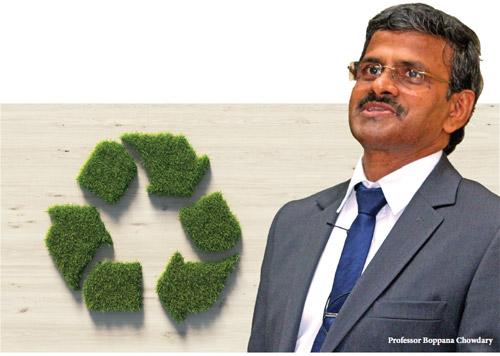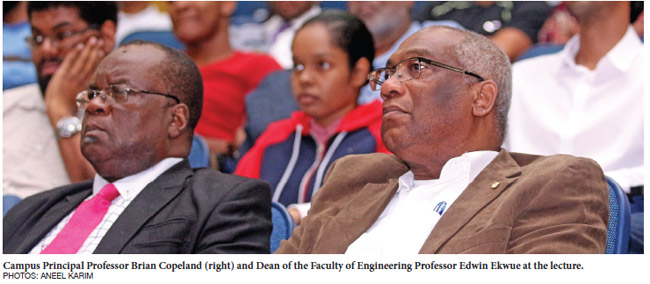
 Professor Boppana Chowdary is an advocate of sustainable innovation. He says, “societies are looking for solutions leading to sustainable economic development.” Professor Boppana Chowdary is an advocate of sustainable innovation. He says, “societies are looking for solutions leading to sustainable economic development.”
He is referring to development that meets the needs of the present without compromising the future. One possible way forward, innovation in manufacturing engineering, was the subject of his professorial inaugural lecture on June 27 at UWI’s Faculty of Engineering. His lecture sought to advance sustainable manufacturing in Trinidad and Tobago through innovation and entrepreneurship in manufacturing engineering.
He is promoting the “3R” policy of Reuse, Reduce, and Recycle for existing products. Professor Chowdary pointed to a plastic recycling project underway at The UWI, whereby recycled plastic is used to create a filament for future use. This not only repurposes waste material but also helps reduce and manage UWI’s expenditure.
The manufacturing engineering process is optimised for completely new products by designing for geometry: that is, maximising product features. Additional considerations are strength and optimal energy consumption regarding moving parts.
Professor Chowdary lauded Singapore and Brazil, countries that have thriving manufacturing sectors. Quoting 2017 data, he noted that Singapore had a population of 5.16 million with a GDP of US$323.9 billion, due in part to industries like electronics, chemicals, bio-medical fields, logistics, vehicles and transportation. Brazil, he noted, (as of 2016-2017) had a population of 207.7 million and a GDP of US$2.036 trillion,with contributions from industries such as textiles, shoes, chemicals, cement, iron ore and aircrafts.
These economies not only show the possibilities for generating prosperity within Trinidad and Tobago through further development of sustainable manufacturing but provide the country with an option beyond the traditional subtractive manufacturing processes. In subtractive manufacturing, parts are crafted out of existing larger materials by removing (or subtracting) excess.
We are now in an era of additive manufacturing. In this process the engineer builds up a component in layers by adding materials. Professor Chowdary calls this a “what you see is what you build” process.
It is also“lean and green”requiring no additional tooling (like clamps) and, by using additive machines like 3D printers, the process is “green” under the 3R policy. Lean manufacturing consistently minimises waste to maximise flow. With 3D printers starting at US$500, Professor Chowdary believes the average person can begin a garage business printing and selling commodities.
Professor Boppana Chowdary upholds manufacturing as important for the nation’s economy, particularly for diversification: “We need to advance. We need to have more exports and less imports.”
Therefore, in order to increase manufacturing activities, we (as a nation) must provide more incentives, including credit. Further, he said, we need to promote private and foreign direct investment, and access to cost-effective technology. Also required are experiential education and problem-based, project-based, inquiry-based, game-based education initiatives.
In that regard, The UWI should continue as a translational hub to facilitate partnership with industry and to promote youth involvement in entrepreneurial activity, including garage-based manufacturing.
Professor Chowdary addresses system design, product design and application or improvement innovation in his research. His personal research activities have included design and selection of manufacturing systems by deployment of Computer Aided Design and Computer Aided Manufacturing (CAD/CAM), Rapid Prototyping (RP) tools and techniques.
Angostura and SM Jaleel and Company Ltd are two of the many firms benefitting from this research. He has innovated job systems by creating Virtual Manufacturing Cell Groupings (groups in the minds of workers for “families of jobs” in order to streamline job flow processes).
He is also an advocate of reverse engineering when there are “worn or broken parts for which there are no drawings which must be replaced” and no local supply.
Campus Principal, Professor Brian Copeland, saw the lecture as an important milestone, demonstrating the way in which The UWI’s academic research impacts real life experience and issues. Principal Copeland emphasised that “innovation gives companies an edge in penetrating markets faster.” As such, strategic approaches to revitalising the Caribbean and an “entrepreneurship ecosystem” are vital for sustainable development.

Professor Boppana Chowdary attained his PhD in 1998 at the Indian Institute of Technology, Delhi and became a professor in India. He subsequently joined the Faculty of Engineering at The UWI, St Augustine as a lecturer. His technical expertise has been used to benefit industry in Trinidad and Tobago in such organisations as the Housing Development Corporation, Water and Sewerage Authority (WASA), and the Tunapuna-Piarco Regional Corporation, earning significant revenue for The UWI through this enterprise. He also helped restructure the MSc Manufacturing, Engineering and Management programme.
Dara Wilkinson Bobb is a part-time lecturer in The Writing Centre in the Faculty of Humanities and Education, where staff and students of The UWI can access free writing assistance. |





